#very large array
Explore tagged Tumblr posts
Text

Very Large Array, New Mexico
37 notes
·
View notes
Text

I was taking one of my famous “short cuts” across the American desert and snapped this sunset image at the Very Large Array radio telescope complex near Socorro, New Mexico
#fine art#landscape#photographers on tumblr#pride#photography#queer hard#queer#queer artist#travel#artists on tumblr#art#artist#artwork#photograph#nikon z8#nikonphotography#nikon#radio astronomy#nasa#nrao#very large array#vla#new mexico#Socorro
16 notes
·
View notes
Text

Very Large Array, New Mexico 2023
10 notes
·
View notes
Video
Very Large Array by Brett Binns Via Flickr: Socorro, New Mexico
#Science#Historical Site#New Mexico#Telescope#Desert#Socorro#Location Recorded#Scenic#Mountains#Mountain#Clouds#Technology#Weather#USA#Very Large Array#flickr#Feeling homesick
12 notes
·
View notes
Text
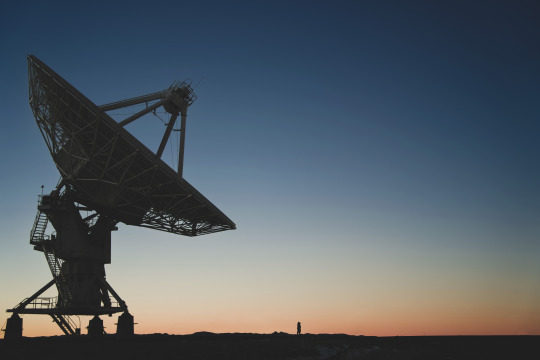
#new mexico#very large array#VLA#photographers on tumblr#photography#astronomy#landscape#landscape photography#sunset#internet dad art
6 notes
·
View notes
Photo

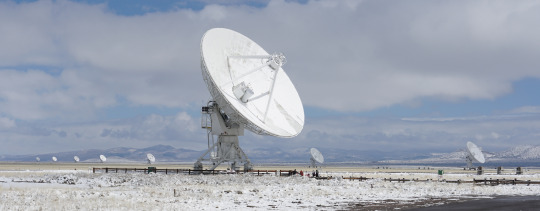



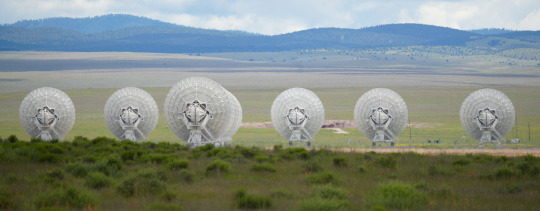
The Very Large Array radio observatory, 24 miles west of Magdalena, NM
📡⭐😍
The 28 telescopes of the VLA are moved on parallel railroad tracks and can be arranged in several Y-shaped configurations with the help of a lifting locomotive. Currently the complex is in configuration B, which spreads out the telescopes over 7 miles. The maximum separation possible is 22.6 miles.
The further apart the telescopes are spaced, the larger the array’s eye, and the more detail it can see.
Oh, and the visitor center is finally open again! :D
#space!#myr on vacation#very large array#nrao#radio astronomy#my pics#first four are from last week#fifth is from 2021#sixth is from 2022 and shows the telescopes in their closest configuration#anyway#i just think absurdly large telescopes are neat
12 notes
·
View notes
Text
Allow me to share with you, unprompted, the greatest photo I have ever taken:
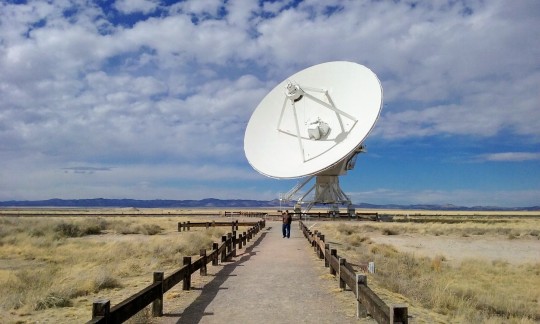
I took this photo at the Very Large Array (a radio astronomy observatory in New Mexico) on a shitty low end android phone from 2013.
That's my dad in the middle of the path. He's about halfway between me and the dish. To give you a sense of how massive these things are, my dad is about 6' 2".
They have about 28 of these on site. The size and number of them is staggering in person. Truly an unforgettable experience.
I absolutely recommend going out of your way to visit the VLA if you're in the area.
Word of advice, though: bring warm clothing and something to cover your face with. It's at a very high altitude in the middle of a flat desert, so the cold wind will eat through a t-shirt like it's tissue paper (and knock you on your ass if you're not careful). I was wearing a couple layers, but even that wasn't enough. You Have Been Warned.
5 notes
·
View notes
Text

VLA, New Mexico
September 13, 2015
4 notes
·
View notes
Text
Massive Radio Array Upgrades to Search for Alien Signals from Other Civilizations
Matriz de radio masiva para buscar señales extraterrestres de otras civilizaciones Crédito de la imagen: VLA/NRAO Publicado 1 mayo 2023 El Instituto SETI, el Observatorio Nacional de Radioastronomía y la Iniciativa Breakthrough Listen se unen para COSMIC y SETI 1de mayo de 2023, Mountain View, CA: uno de los conjuntos de radiotelescopios más poderosos del mundo se une a la búsqueda de señales…

View On WordPress
2 notes
·
View notes
Text

Very Large Array, New Mexico
0 notes
Text
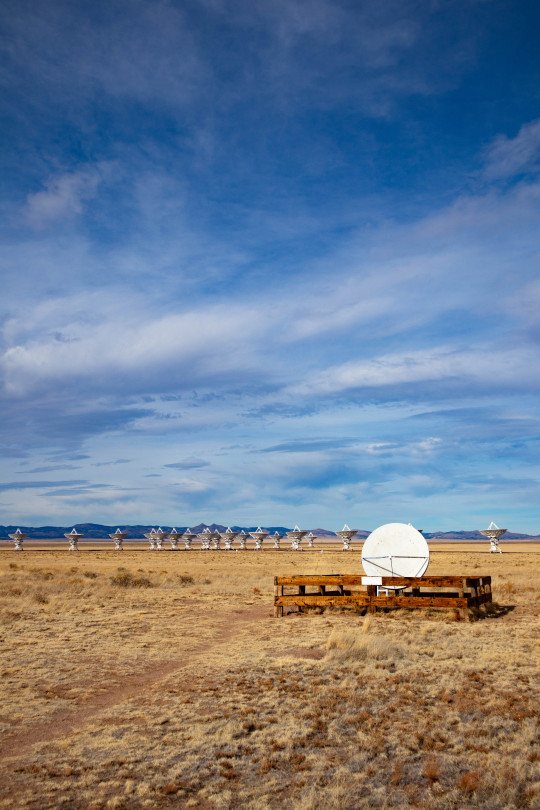
1 note
·
View note
Text
ESO detecta o campo magnético mais distante de uma galáxia
NOTÍCIA: Astrônomos usam o ALMA para detectar o campo magnético mais distante de uma galáxia. A galáxia 9io9 tem um campo magnético tão forte quanto o da Via Láctea
Uma equipe internacional de astrônomos, usando o Atacama Large Millimeter/submillimeter Array (ALMA), um conjunto de antenas localizado no deserto do Atacama, no Chile, fez a primeira detecção confirmada de um campo magnético em uma galáxia muito distante. A galáxia, chamada 9io9, está tão longe que a sua luz demorou mais de 11 bilhões de anos para chegar até nós, o que significa que estamos…
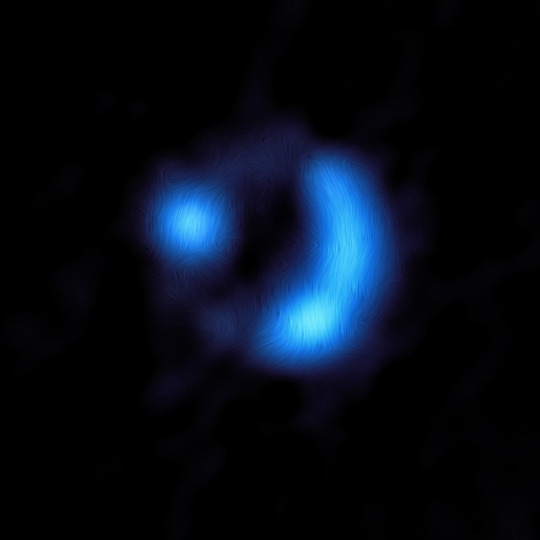
View On WordPress
#9io9#ALMA#Atacama Large Millimeter/submillimeter Array#Campo Magnético#dínamo#ESA#ESO#Galáxia#Grande Nuvem de Magalhães#NASA#Radiotelescópio#Telescópio Espacial Hubble#Telescópio Subaru#Very Large Array#Via Láctea#VLA
0 notes
Text
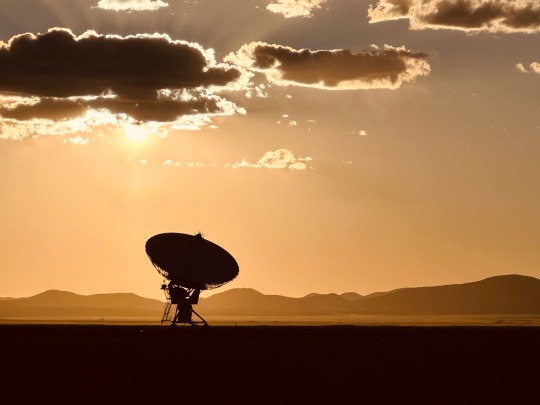
NRAO Very Large Array (VLA), Socorro, NM
19 notes
·
View notes
Photo
(source)

3C175: Quasar Cannon
Credits: Alan Bridle, NRAO Charlottesville, VLA, NRAO, NSF
26 notes
·
View notes
Link
Astronomy Daily - The Podcast: 10th October 2024 Welcome to Astronomy Daily, your Daily dose of space and Astronomy news. I'm your host, Anna. Today we have an exciting lineup of stories that I can't wait to share with you. First, we'll delve into NASA's Europa Clipper mission, which is ready to embark on an epic journey to Jupiter and its intriguing moon Europa. Then we'll talk about Elon Musk and SpaceX's ambitious plans to launch uncrewed starships to Mars in just two years, paving the way for future human colonization. We'll also uncover a groundbreaking study on fast radio bursts that might finally solve the mystery behind these cosmic phenomena. And if that isn't enough, we'll explore new findings suggesting the moon might still be volcanically active today. Lastly, we'll highlight NASA's innovative solar sail that you can actually spot from Earth. Buckle up, space enthusiasts. Let's dive in. Highlights: - NASA's Europa Clipper Mission: NASA's Europa Clipper spacecraft has reached a significant milestone by passing its final technical review. This means it's now all set for its journey towards Jupiter. With a launch window slated between October 10 and 30th, the mission aims to delve into the mysteries of Jupiter's moon Europa, potentially harboring an ocean beneath its icy crust. - SpaceX's Mars Ambitions: Elon Musk recently announced that SpaceX plans to launch its first uncrewed starships to Mars within the next two years. These missions are crucial for testing the reliability of landing these advanced spacecraft intact on the Martian surface. If successful, crewed flights to Mars could follow just two years later, paving the way for human colonization. - Fast Radio Bursts Mystery Possibly Solved: A groundbreaking new study by the Italian National Institute for Astrophysics has advanced our understanding of fast radio bursts (FRBs). Using the Very Large Array telescope, researchers recorded the weakest persistent radio emission for an FRB, shedding light on the mysterious origins of these powerful cosmic events. - Volcanic Activity on the Moon: Recent findings from the Chinese Chang'e 5 mission suggest that the moon might still be volcanically active. Tiny glass beads found in lunar samples indicate that volcanic activity might have occurred as recently as 123 million years ago, challenging the traditional belief that lunar volcanism ceased 3 to 3.8 billion years ago. - NASA's Solar Sail: NASA's advanced composite solar sail system is now visible from many locations around the world. This groundbreaking solar sail, which harnesses sunlight for propulsion, represents an exciting step towards more sustainable and accessible deep space missions. Engage with NASA's "Spot the Sail" campaign and track the solar sail using the free NASA app. For more space news, be sure to visit our website at astronomydaily.io. There you can sign up for our free Daily newsletter, catch up on all the latest space and Astronomy news with our constantly updating news feed, and listen to all our back episodes. Don't forget to follow us on social media. Just search for #AstroDailyPod on Facebook, X, YouTubeMusic, and TikTok to stay connected with our community and never miss an update. Thank you for tuning in, and remember to keep your eyes on the skies. Until next time, may you be blessed with clear skies. Sponsor Links: NordVPN NordPass Malwarebytes Proton Mail Become a supporter of this podcast for commercial-free editions not very much moeny: https://www.spreaker.com/podcast/astronomy-daily-the-podcast--5648921/support
#array#binary#bursts#chang'e#clipper#elon#europa#fast#inaf#large#magnetar#mars#mission#musk#nasa#radio#spacex#telescope#very#x-ray
0 notes
